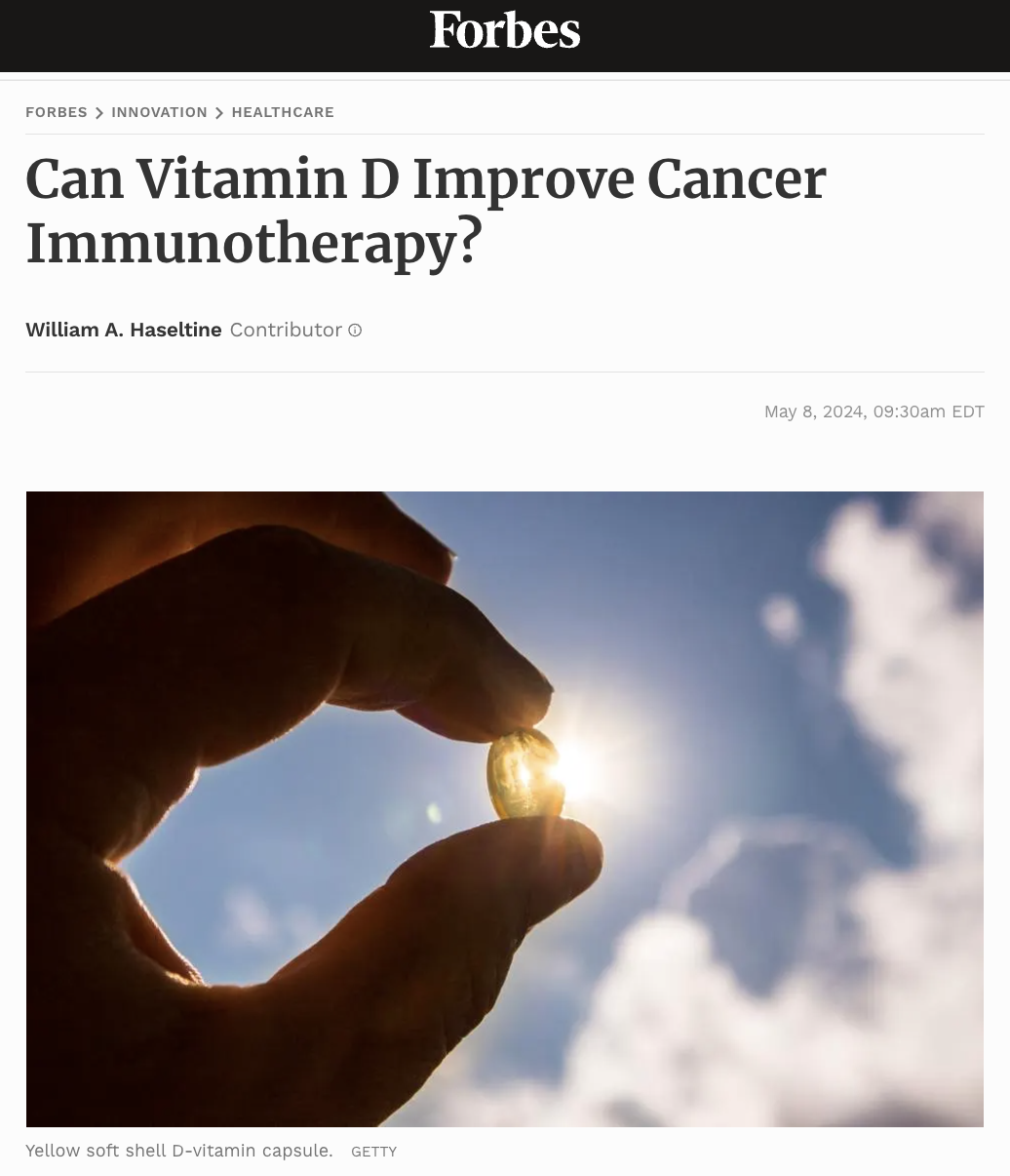Whether by rays of sun or through capsules, it’s important for everyone to get their daily dose of Vitamin D. This essential vitamin is known to help the body absorb calcium, the foundation of healthy bones and teeth. New research says this nutrient may possess another unknown benefit: helping the body fight cancer. Preclinical findings published in the journal Science suggest that vitamin D intake can influence the immune system through the intestines; this, in turn, could improve antitumor responses to a class of cancer immunotherapies called checkpoint inhibitors.
At the center of this research lies the hazy, but continually clarifying, axis between the intestinal microbiome, the immune system, and cancer.
Within the last two decades, new connections have emerged between the gut microbiome—the trillions of microorganisms living in our stomachs, intestines and colons—and the immune system. Researchers note that changes in the microbiota can influence the incidence and progression of cancers beyond the colon, including breast and liver cancer. The microbiome could also be an important factor in improving checkpoint inhibitors, an antibody-based immunotherapy used to treat several types of cancers.
Several intestinal bacteria strains in mice are found to improve anti-tumor responses to checkpoint inhibitors. Taking antibiotics, which damage the intestinal flora, is also correlated with poorer responses to this inhibitor therapy; oral supplements can restore these responses in antibiotic-treated mice. Additionally, studies have observed that melanoma patients who respond to PD-1 checkpoint inhibitors tend to possess more “good” bacteria; nonresponders had an intestinal flora imbalance, which was correlated with impaired immune cell activity.
Altogether, these findings suggest a complex interplay between the intestines and the immune pathways that checkpoint inhibitors affect. By targeting the microbiome through supplements, diet or other means, it could be possible to significantly improve outcomes for patients undergoing this therapy.
In their work, researchers from the Francis Crick Institute in London investigate the link between intestinal microbiota and its effect on anticancer immunity through vitamin D.
Most people are familiar with vitamin D and its effect on the bones. Vitamin D, also known as calciferol, is a fat-soluble nutrient that promotes calcium absorption. The nutrient can be found in two forms: vitamin D3 and vitamin D2. The skin can produce vitamin D3 from exposure to ultraviolet B in sunlight. The nutrient is also naturally found in animal-derived foods, including fatty fish such as salmon and tuna. In contrast, vitamin D2 is sourced from a limited selection of plants. Both forms are broken down into smaller molecules in the liver and kidneys.
Perhaps lesser known is vitamin D’s effect on intestinal immunity. T cells, B cells and other immune cells in the intestines express vitamin D cell receptors, hinting at its role in maintaining intestinal immunity. Vitamin D deficiency is also associated with increased autoimmunity and risk of infection. Could vitamin D interact with intestinal cells to influence antitumor immunity?
To investigate the link between vitamin D and tumor resistance, researcher Giampazolias and colleagues turned to mouse models of melanoma. The mice had a deficiency in globulin, a protein that carries vitamin D throughout the body. Animals with less globulin in the blood appear to possess higher levels of vitamin D in the tissues. Following this train of thought, the team expected mice with less globulin—and therefore more vitamin D—would show better antitumor responses.
When given a tumor challenge, globulin-deficient mice outperform mice with sufficient globulin. They control tumors better, display higher intratumoral levels of activated T cells, and respond more readily to checkpoint inhibitor therapy.
Vitamin D anticancer responses appear to be hinged upon the microbiome. Normal mice should exhibit worse tumor control compared to globulin-deficient mice. However, these mice can acquire this tumor resistance if housed with globulin-deficient mice for a time. Likewise, a fecal transplant from deficient mice can enhance tumor control in microbiota-replete mice.
This mechanism appears to be dependent on vitamin D availability. When normal mice and globulin-deficient mice are fed a diet devoid of vitamin D for four weeks, both cohorts suffer rapid tumor progression. Inversely, increased vitamin intake leads to elevated vitamin D levels in the blood and decreased tumor growth in normal mice; these levels are comparable to their globulin-deficient counterparts.
Mice without microbiota did not experience improved antitumor activity when placed on a high vitamin D diet, and fecal transplants from vitamin D-deficient mice failed to confer tumor resistance. Both results underscore a connection between vitamin D antitumor responses and the microbiome. This interaction likely acts through vitamin D uptake in the intestinal epithelial cells, according to gene expression analysis of colonic tissue.
The researchers also extended their findings to humans. They examined gene signatures of vitamin D activity in different cancers using data from The Cancer Genome Atlas and found that lower expressions of vitamin D activity correlate with poorer patient outcomes. Additionally, an analysis of over one thousand patients treated with checkpoint inhibitors associated lower vitamin D availability in tissues to more rapid cancer progression.
The team also turned to data on a large cohort of Danish participants who had at least one vitamin D serum measurement before their first cancer diagnosis. They noted that low vitamin D serum levels correlate to increased cancer risk over a decade, highlighting vitamin D as a prospective risk factor for human cancer development.
Checkpoint inhibitors, while a remarkable advance in cancer care, deliver varying results. For some patients, they evoke durable responses; for others, no responses at all. While further study is needed to determine the exact mechanism at hand, this study points to vitamin D as a possible solution. If the link between this nutrient and antitumor responses remains true in humans, cancer patients undergoing checkpoint inhibitor therapy could increase their vitamin D intake to improve tumor resistance—a simple diet change with potentially huge benefits. This study joins a sea of research probing the potential of microbes to improve checkpoint inhibitor therapy.


